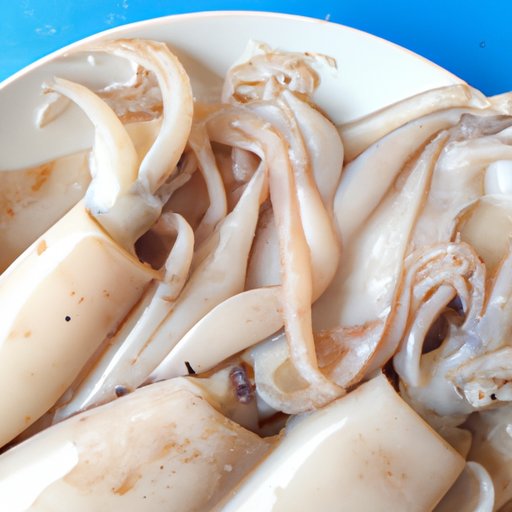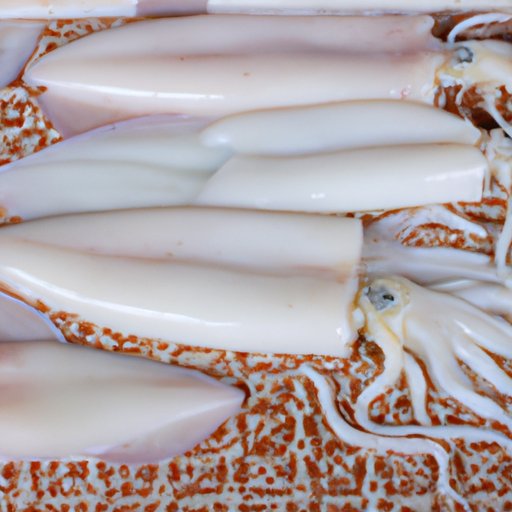Introduction
Squid is a type of seafood that has been enjoyed around the world for centuries. It is a popular ingredient in many cultures, from Italian calamari to Asian stir-fries. But is squid healthy? In this article, we’ll explore the nutritional benefits of squid and look at the potential health benefits of eating this versatile seafood.
What is Squid?
Squid is a cephalopod mollusk that belongs to the same family as octopus, cuttlefish, and nautilus. It is found in oceans around the world and is harvested for food. Most of the squid consumed in the United States is imported from China, Japan, Thailand, and Vietnam. Squid has a mild flavor and firm texture, making it a popular ingredient in a variety of dishes.
Health Benefits of Eating Squid
Squid is a nutritious seafood that is low in calories and high in protein. It is an excellent source of essential vitamins and minerals and is rich in omega-3 fatty acids, which are important for heart health. Eating squid can also provide other potential health benefits, such as improved digestion, reduced risk of certain cancers, and improved brain function.
Nutritional Benefits of Squid
Squid is a good source of protein, providing about 18 grams per 3-ounce (85-gram) serving. It is also a good source of essential vitamins and minerals. A 3-ounce serving of cooked squid provides:
- Vitamin B12: 24% of the Daily Value (DV)
- Niacin: 17% of the DV
- Selenium: 16% of the DV
- Phosphorus: 11% of the DV
- Copper: 9% of the DV
Squid is also a good source of omega-3 fatty acids. These fats are important for brain health and may help reduce inflammation and lower cholesterol levels.

How Eating Squid Can Improve Your Health
Eating squid may provide a variety of health benefits, including improved heart health, reduced risk of certain cancers, and improved digestion. Here’s a closer look at some of the potential benefits of eating squid:
Improved Heart Health
The omega-3 fatty acids found in squid can help reduce inflammation and lower cholesterol levels, both of which can benefit heart health. A study in the journal Nutrients found that eating a diet rich in omega-3 fatty acids can help reduce the risk of heart disease.
Reduced Risk of Certain Cancers
Research suggests that squid may help reduce the risk of certain types of cancer. A 2012 study in the journal Cancer Prevention Research found that people who ate more seafood had a lower risk of colorectal cancer. Additionally, a 2019 study in the journal Nutrients found that eating squid may reduce the risk of esophageal cancer.
Improved Digestion
Squid is high in selenium, which plays an important role in digestive health. Selenium helps the body produce enzymes that aid in the digestion of food and the absorption of nutrients. It also helps protect cells from damage.

Exploring the Health Benefits of Squid
In addition to its nutritional benefits, squid may offer other potential health benefits. Studies suggest that squid may have anti-inflammatory and antioxidant properties, which could help protect against chronic diseases. Additionally, squid is low in calories, making it a good choice for those looking to lose weight.
Anti-inflammatory Properties
Squid contains astaxanthin, an antioxidant that has powerful anti-inflammatory properties. Animal studies suggest that astaxanthin may help reduce inflammation and oxidative stress, which are linked to a variety of chronic diseases.
Rich in Antioxidants
Squid is also a good source of other antioxidants, such as zinc, copper, and vitamin E. These antioxidants can help protect cells from damage caused by free radicals, which are associated with aging and various diseases.
Low in Calories
Squid is low in calories and fat, making it a good choice for those looking to lose weight. A 3-ounce (85-gram) serving of cooked squid contains just 81 calories and less than 1 gram of fat. It is also a good source of protein, which can help you feel fuller for longer.
Is Squid a Healthy Choice for Everyone?
While squid is generally safe to eat, there are some factors to consider. People who have seafood allergies should avoid squid. Additionally, some people may be at risk for mercury poisoning, so it’s important to speak to your doctor before adding squid to your diet.
Factors to Consider
When choosing squid, it’s important to consider where it comes from. Some imported squid may contain contaminants, such as mercury or lead. To reduce your risk, choose squid that is certified by the Marine Stewardship Council or other reputable organizations.
Dietary Restrictions
If you follow a vegetarian or vegan diet, squid is not a suitable option. Additionally, if you follow a gluten-free diet, it’s important to check the label of any prepared or processed squid products, as they may contain wheat or other gluten-containing ingredients.
What Makes Squid a Good Source of Protein?
Squid is a good source of quality protein. It is a complete protein, meaning it contains all nine essential amino acids. These amino acids are important for building and maintaining muscle mass, as well as for other bodily functions.
Quality Protein
Squid is a good source of high-quality protein. A 3-ounce (85-gram) serving of cooked squid contains 18 grams of protein, which is equivalent to the amount of protein in two large eggs. Protein is important for building and maintaining muscle mass and for other bodily functions.
Amino Acid Composition
Squid is a complete protein, meaning it contains all nine essential amino acids. These amino acids are important for building and maintaining muscle mass, as well as for other bodily functions. Studies suggest that consuming complete proteins can help promote muscle growth and repair.
The Pros and Cons of Eating Squid
Eating squid can provide a variety of health benefits. It is a good source of protein, vitamins, minerals, and omega-3 fatty acids. Additionally, squid may have anti-inflammatory and antioxidant properties. However, there are some potential risks to consider, such as contaminants and allergic reactions.
Pros
Squid is a nutritious and versatile seafood that is packed with protein, vitamins, minerals, and other beneficial compounds. Eating squid can provide a variety of health benefits, such as improved heart health, reduced risk of certain cancers, and improved digestion.
Cons
Some imported squid may contain contaminants, such as mercury or lead. Additionally, people who have seafood allergies should avoid squid. It is also important to speak to your doctor before adding squid to your diet, as some people may be at risk for mercury poisoning.

Understanding the Health Risks Associated with Eating Squid
While squid is generally safe to eat, there are some potential health risks to consider. Contaminants, such as mercury or lead, may be present in some imported squid. Additionally, people who have seafood allergies should avoid squid. It is also important to speak to your doctor before adding squid to your diet, as some people may be at risk for mercury poisoning.
Contaminants
Some imported squid may contain contaminants, such as mercury or lead. To reduce your risk, choose squid that is certified by the Marine Stewardship Council or other reputable organizations.
Allergic Reactions
People who have seafood allergies should avoid squid. Symptoms of a seafood allergy may include hives, itching, swelling, nausea, vomiting, and difficulty breathing. If you experience any of these symptoms after eating squid, seek medical attention immediately.
Conclusion
Squid is a nutritious and versatile seafood that is packed with protein, vitamins, minerals, and other beneficial compounds. Eating squid may provide a variety of health benefits, such as improved heart health, reduced risk of certain cancers, and improved digestion. While squid is generally safe to eat, there are some potential health risks to consider, such as contaminants and allergic reactions. Speak to your doctor before adding squid to your diet to make sure it is the right choice for you.
(Note: Is this article not meeting your expectations? Do you have knowledge or insights to share? Unlock new opportunities and expand your reach by joining our authors team. Click Registration to join us and share your expertise with our readers.)
